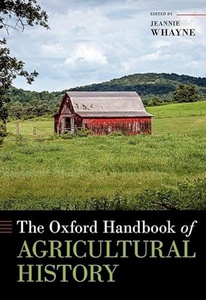RHN 48/2024 | Publication
Jeannie Whayne (ed.), The Oxford Handbook of Agricultural History (Oxford University Press, 2024).
Agricultural history has enjoyed a rebirth in recent years, in part because the agricultural enterprise promotes economic and cultural connections in a more globally focused era, but also because of agriculture’s potential to lead to conflicts over precious resources. History is replete with stories of armies standing or falling as a result of their supply of agriculturally produced commodities; civilizations have likewise succumbed because of famine or crop-related pestilence. The importance and fragility of agricultural systems will come into much greater focus because of climate change, something farmers the world over have begun to reckon with; urban people, too, will become ever more conscious of their own reliance upon agriculture. The contemporary critical evaluation of agriculture reflects a transition from a framework that celebrated the positive aspects of the evolution of agriculture to one that also explores its negative implications, such as the emergence of intensive and extractive agriculture that has harmed indigenous peoples and disrupted traditional political economies. The Oxford Handbook of Agricultural History reflects this rebirth and examines the wide-reaching implications of agricultural issues. Contributors to this volume include historians from around the world and specialists in European, American, African, Middle East, Russian, and Asian history. Essays touch on the Green Revolution, the development of the Atlantic slave plantation, the agricultural impact of the American Civil War, the rise of scientific and corporate agriculture, and modern exploitation of agricultural labor. This is an essential volume for those interested in the myriad ways that agricultural systems affect our world.
Source: Oxford Academic
